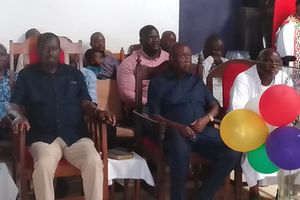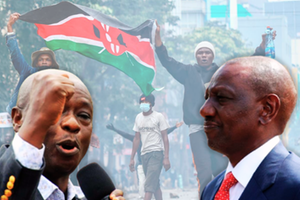Aiming at the stars with Priscilla’s precision

What you need to know:
- Priscilla competed in National Rifle Association (NRA) smallbore championship in the UK in 2018 and won silver.
- Here in Kenya, Priscilla has won many medals and trophies in fullbore and smallbore catgories. She has over 30 trophies and a similar number of medals, including the silver medal she got in AK47 at the Eastern Africa Police Chiefs Co-operation Organisation (EAPCCO) Games in 2021.
- Priscilla’s two silver medals are the first medals Kenya has won in the women's category in shooting.
Priscilla Wangui Mburu, 32, is the 10th born in a family of 11. She attended Gataara Primary School and St Mary's Secondary School Thigio and later Kenya Police Training College, Kiganjo. Priscilla acquired the International Olympic Committee (1OC) Scholarship in May 2022. The police officer is currently pursuing an undergraduate degree in counseling psychology at Salt Lake Bible College in the US. Her first international competition in the Olympic disciplines was the 14th African Shooting Championship in Tipasa, Algeria in 2019. She made a score of 601, thereby qualifying for the next stage.
How did you start this shooting journey?
Growing up, I did not love any sport. I was a softie. I tried badminton in high school, but only because we were required to be in at least one sport. I didn’t love it.
I started shooting in 2015 when I joined the police and we were introduced to guns. That’s where I discovered my love for shooting, and I proved to be really good at it. My instructor took a keen interest in training me further to become a trainer of trainers in Kiganjo.
After I graduated from the recruits programme, I joined the Kenya Sports Shooting team. I have been a Firearms Instructor in Kiganjo for the last seven years, until January 2023 when I got transferred to the Nairobi Area training college.
What specific challenges have you encountered in this sport?
There are quite a number. Shooting is one expensive sport, if not the most expensive. You have to have your own equipment, starting from your own rifle and shooting gear which includes the special jacket, a pair of trousers and shoes, stands, gloves and everything else.
You have to buy your own ammunition, too, and it is not cheap. Every three years, I have to change my kit or else it won’t pass the equipment test when I go for an international event. The funds part of this sport is the most challenging, but I’m very lucky because I acquired a scholarship with the International Olympic Committee after being ranked fifth in Africa.
Kindly give us a breakdown of the costs involved…
I use .177 pellets that go for Sh2,500 for a box of 450 rounds. You might think that 450 rounds is a lot, but it is not. In a practice session at the range, you can use between 200 and 300 rounds a day, meaning I might use a box for only two days. For the kit, you must have at least Sh200,000 to acquire just the jacket and trousers.
What’s the view of your family about this sport?
I don’t come from a sporting family, but they are my biggest cheerleaders, be it my parents or my daughter. Those are the people who push me to give it my all.
Why do you like shooting so much?
I have travelled the world and been to more than seven countries for competitions. Just the other day I was at an Olympic Team training camp in Miramas in France for two weeks.
What does it take to be a great shooter?
Excellence in shooting starts in the mind. You have to be like 100 per cent prepared before you step onto the range. If I come from home with anxiety, I will not be able to concentrate. Bear in mind that what I’m aiming at is a 10.9 shoot, and that is like shooting at a strand of hair. Imagine if you have anxiety or are stressed, you won’t be able to hit anything.
You also need to work on your physical strength, so I go to the gym in the evenings and when I have time in the morning, I go swimming. Swimming helps, especially in holding my breath, because you have to hold your breath as you shoot.
What is your greatest dream?
To qualify for the Olympics. Not just to qualify, but also to win at the Olympics and prove to other nations that even an African and Kenya can win. I think we have the ability. I believe I am quite close to achieving that dream. At the just-concluded African Championships in Egypt, I came second. Unfortunately, the Olympics ticket was reserved for only the gold medalist, so I missed it by a whisker. I need to attend more training camps, and to have a coach that works with me every day.
Tell us about your nickname and what it means to you...
Some of my friends call me “Precision” because of my shooting accuracy. I love the nickname. I don’t mind it. I actually have a couple of hoodies with the name “Priscilla Precision” on them.
You are the best in Olympic shooting in Kenya in 50m prone; what does it take to get there?
Passion and training. I believe even if you have all the talent in the world, without training, it doesn’t mean a thing. You can have all the talent, but if I train hard, I will surpass you.
Apart from shooting, what else do you do?
I am a police officer. It wasn’t my dream job, but life happened. I wanted to be an air hostess, but I was considered too short for the job.
What advice would you give to somebody who wants to follow in your footsteps?
First, know what you want. Don’t do it because somebody else is doing it. Have a passion for it. It gets easier when you love it. Have a clear goal of what you want and go for it. Start now.
Who is your role model?
Sport shooter Abhinav Bindra from India. He is a legend in shooting. He won the first ever individual Olympic gold medal for India in the 2008 Olympics in Beijing, China. He had gone to two Olympics since 2000, but he only won in 2008. That's the kind of resilience and ambition I have. I like him because he loved shooting as much as I do, but I think my passion is more, and he worked so much without giving up until his dream came true. He went to the extent of getting a Lasik surgery to perfect his vision.





